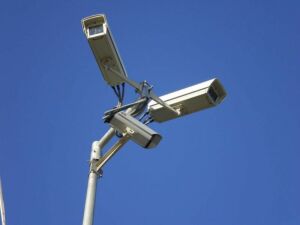News
DF wants more video surveillance
This article is more than 10 years old.
Denmark’s four largest cities to have video cameras on central streets and squares

The proposal is aimed at assisting police in their investigations (photo: Paweł Zdziarski)
Dansk Folkeparti (DF) has called for increased video surveillance throughout the central streets and squares of Denmark’s four largest cities.
The four-year proposal is part of a police package worth 5 billion kroner.
According to the proposal, police must also be allowed to use facial recognition software to assist in catching criminals, and the cameras must be monitored by police emergency call centres.
“The cameras will make it easier for the police to catch criminals and terrorists,” Dansk Folkeparti spokesman Peter Skaarup told Metroxpress.
“Britain has experienced success with face recognition technology in the past, with the ability to check camera images against a criminal register. This new initiative means we can too,” said Skaarup.
At the same time, Dansk Folkeparti wants a central registry for the country’s 500,000 private security cameras.
“The plans are already on the way. That said, it is certainly sensible to look at whether the police require more cameras,” Socialdemokraterne spokeswoman, Trine Bramsen, told Metroxpress.
CCTV cameras played an important role in tracking down the gunman responsible for the Copenhagen terror shootings in mid-February, although it took the police a number of hours to access the footage.
READ MORE: Justice Ministry critical of police in terror attack evaluation report
‘Big Brother’ state
However, not everyone was in agreement over the proposal.
Jesper Lund, the president of the IT-Political Association, calls it an escalation of monitoring and invasion of privacy.
“This will mean that citizens will constantly feel as if they are being watched. They will never know when the police are around. I question how effective that is,” he told Metroxpress.
Comparatively, the president of the security industry says it is only a matter of time before facial recognition is used effectively in society.
“As a starting point, we believe that you have to monitor if there is a real reason for it,” Kasper Skov Mikkelsen told Metroxpress.










































